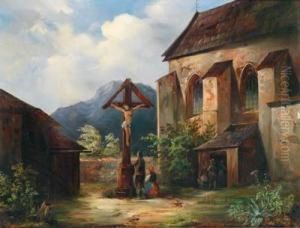Karl Moser Paintings
Karl Moser was a Swiss architect and artist, born on August 10, 1860, in Baden, Switzerland. He played a pivotal role in the development of modern architecture in Switzerland and was a leading figure in the transition from historicist styles to modernism in Swiss architecture. Throughout his career, Moser was deeply influenced by the Arts and Crafts movement and later by the principles of the German Werkbund, which advocated for the integration of art, industry, and craftsmanship.
Moser's early work was characterized by a blend of traditional Swiss architectural elements with the emerging styles of the time. However, his style evolved significantly over his career, and he became a proponent of modernist architecture, using new materials and construction techniques to achieve innovative designs. One of his most significant contributions to modern architecture was his emphasis on functionality, simplicity, and the use of light.
In 1896, Moser partnered with Robert Curjel, and together they established the architectural firm Curjel & Moser in Karlsruhe, Germany. The firm was responsible for numerous buildings in Switzerland and Germany, ranging from residential buildings to large public projects. Among their most notable works are the Kunsthaus Zürich, a major art museum in Zurich, and the Grossmünster's renovation, an iconic Romanesque church in the same city. These projects highlighted Moser's skill in adapting modernist principles to different types of buildings and his ability to blend the new with the existing urban and historical contexts.
Moser was also a key figure in education, serving as a professor at the Swiss Federal Institute of Technology (ETH Zurich) from 1915 until his retirement in 1930. During his tenure, he influenced a generation of architects and advocated for the modern movement in architecture, emphasizing the importance of social responsibility among architects. His teachings helped shape the future of Swiss architecture and ensured the continuation of his modernist ideals.
Karl Moser's legacy is that of a pioneer of modern architecture in Switzerland, whose work laid the groundwork for the development of modernist architecture in the country. He passed away on October 24, 1936, in Zurich, but his influence endures through his buildings and the principles he championed throughout his career.




